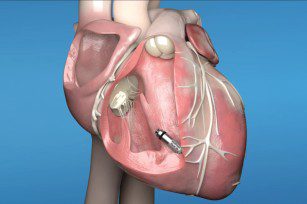RAMAT GAN, Israel – June, 2022 – Sheba Medical Center, Israel’s largest medical center and a Newsweek top-10 ranked world’s best hospital for the last four years, announced today that it has been authorized by Medtronic International to provide training on MICRA pacemaker implants for experts in arrythmia treatment.
Sheba Medical Center has many years of experience in MICRA implants, which are performed at the Davidai Center for Rhythm Disturbances and Pacing at the Sheba Medical Center, managed by Prof. Roy Beinart. This week, the first training was held with the participation of seven doctors from several hospitals across Israel and led by Prof. Eyal Nof,
Director of the Invasive Electrophysiology Service at Sheba Medical Center and a certified facilitator to conduct training on the subject.
“As a medical center ranked among the top of the best hospitals in the world, we have made it our mission to lead the education and training of medical teams,” said Prof. Roy Beinart. “This project, the result of a collaboration with Medtronic, is part of that commitment. We will continue to provide the best medicine to our patients, using leading technologies such as MICRA and other innovations.” The MICRA is a tiny 2.5 cm rationing capsule, 93% smaller than a regular pacemaker, and implanted using a simple venous catheterization through the groin vein without leaving a scar on the chest. The system is implanted without additional devices in the body, unlike standard pacemakers which also require the implantation of electrodes that connect the heart compartments to the pacemaker.
The technology is currently intended for patients who, for technical or medical reasons, cannot undergo pacemaker implantation with electrodes (such as patients with venous obstruction). It is also suitable for patients with a high risk of infection from the implantation of a traditional pacemaker and without which they would be left without a medical
response which may put them at high risk of significant complications. Over the past year, more than 150 patients have undergone MICRA transplantation in various indications.
Clinical studies published in recent years, which included thousands of patients who underwent a MICRA transplant, showed that for the vast majority of patients, the MICRA transplant was successful, the rate of infections was significantly lower, and the rate of complications was significantly lower than that of a standard pacemaker transplant
(a reduction of about 60% in the rate of complications). In light of the results of the above publications and the positive global experience gained in the treatment with MICRA,
the European Cardiological Association (ESC) has recommended in its latest guidelines on pacemakers that MICRA should be implanted as an alternative to normal pacemakers in patients with appropriate indications.
About Sheba Medical Center
The largest and most comprehensive medical center in the Middle East, Sheba Medical Center, Tel Hashomer is generating global impact through its medical care, research and healthcare transformation. Sheba’s City of Health boasts an acute-care hospital, rehabilitation hospital, research and innovation hubs, medical simulation center and center for disaster response on one comprehensive campus in the center of Israel. A university teaching hospital
Sheba, affiliated with the Sackler School of Medicine at Tel-Aviv University, is shaping the future of healthcare, educating the next generation of care providers. Sheba serves as a true hospital without borders, welcoming patients and healthcare professionals from all over the world and consistently providing the highest-level medical care to all in need.


